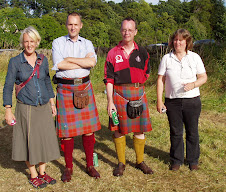Little knitting was done yesterday, as
often on a Sunday, but I moved a little bit forward with that sleeve.
I found the Sirka counter, reminded myself how to use it (the
packaging is gone), and embarked on a task right up its street –
decreasing every fifth round 24 times. I note with alarm what you say
about the beautiful red yarn I mean to use for the inside of the
hems, Leslie. The best I can say is that I hope I will take your
advice about fixing the colour.
I knit entire red madtosh sweaters for
the Thomases, elder and younger, a few years ago. I wonder how
they're getting on? It's possible, indeed likely, in both cases that
the sweaters aren't much worn.
In other news, James rang up to
introduce a scheme my excellent children have come up with – to
transport my husband to Sydenham for Holy Week, when I am in Athens.
Alexander will drive him down in his powerful, comfortable car. He
will be housed, not in the spare bedroom on the mezzanine – it's a
big London house – but in the little-used front parlour on the
ground floor. You never saw a house with so many lavatories, so that
will be all right.
My husband has advanced a number of
difficulties – would it be better to fly? To take the train? What
would he do all week once he got there? (Take the computer along,
perhaps?) And then he'd have to come back again.
We shall see.
Sometimes in moments of gloom I feel I
have squandered my talents in a life of incompetent domesticity. But
then, on the other hand, there are moments like this. I am the mother
of Rachel, Alexander, James and Helen. The mother of the Gracchi
could hardly have done better. Being President of the International Monetary Fund would have been trivial by comparison.
Rachel also phoned last night – her
son Joe was knocked off his bicycle on his way to work the other day.
The police phoned Rachel while she was on her
way to work, and she got to the hospital before the ambulance arrived
with Joe in it. There has been a lot in our news lately about A&E
departments being overwhelmed. Joe was treated immediately, and
continued to be attentively monitored even after it turned out that
he was essentially all right.
The
bicycle came out of it less well.
Rachel
and I think that a lot of the difficulty in A&E is caused by
people who call for an ambulance when they feel a bit poorly. When
they get to the hospital, they are subject to a process called
“triage” which gives precedence to people like Joe. My husband
says that “triage” means “shunting” in French.
Coding:
I enjoyed it a lot, once. No time, now. Learning BASIC was a major
intellectual excitement in my middle years. We had a couple of
computers in the school where I taught Latin – this was in the days
just before the introduction of the IBM PC. The maths teacher had
devised a programming course for dull girls, all the books being too
complicated for them.
She
gave it to me, and I went off and had a go. The first task was to do
something or other, and to count how many times you had done it. I
could do the task, all right, but how to do the counting? I went back
to the maths teacher. She said, put in a line saying x=x+1.
It was
an electrifying moment for me – a simple and impossible equation in
the mathematics I thought I knew, a whole new way of dealing with the
world.




The IMF would have been much more interesting with you at the helm! What a thought!
ReplyDeleteSplendid plan for Holy Week, now you can go on your trip and enjoy every moment.
Triage, I am assured means 'sifting' ie finding and prioritising those who need urgent attention; though 'shunting' may seem appropriate if one has a lengthy wait.
Best wishes Helen
Well done as a parent - also, I'm sure there are many out there who understand the Gracchi reference because of your teaching.
ReplyDeleteApproximate quote from a college professor in the 1950's - oh you're just going to get married, what's the point of going to graduate school?
ReplyDeleteWell, I'm very happy to say I did go to graduate school and I did get married (eventually!) and I am very proud of my 3 sons. My academic career was patchy - partly because of attitudes toward women and partly because we kept moving from country to country. I have no regrets. Dr. J. McKee
Triage means sorting or selection (see Larousse). The French first developed a triage system in managing their battlefield hospitals during World War 1. The concept (and term) are now used universally in medical practice in situations like emergency rooms. We saw it in A&E in Darlington when Roger had his stroke. We had come in by car but when the lady behind the desk heard what his complaint was she pushed a button and they immediately whisked him off to get care. Sister Helen
ReplyDeleteWhat a fine post, Jean - children, the Gracchi, Basic, and your x=x+1 revelation. The delight of these small mathematical insights deserves more publicity.
ReplyDelete- Beth in Ontario
Triage may well be used for "shunting" but the essential meaning is sorting into three groups. Particularly in military sitations it comes down to this : two groups wait - the ones for whom there is no hope, and the ones that have only minor injuries. The middle group, who are seriously injured, but save-able get the concentration of attention. It's a way of making sure that limited numbers of medical practitioners are working where they can do most good.
ReplyDelete